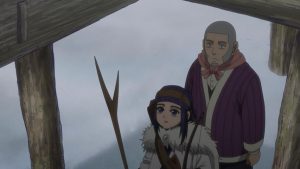 It’s certainly not news that Golden Kamuy is a pretty darn great series. But even by its own pretty high standards, the last two episodes have been kind of special. Any show that can be this brilliant in successive weeks with such spectacularly different material deserves that little bit of extra recognition. That kind of stylistic versatility isn’t by any means a prerequisite for a series to be great, but it is pretty rare. Part of it comes from how diverse and deep the cast it, but at least as important is Noda’s tremendously varied storytelling. He’s all over the map, and in a good way.
It’s certainly not news that Golden Kamuy is a pretty darn great series. But even by its own pretty high standards, the last two episodes have been kind of special. Any show that can be this brilliant in successive weeks with such spectacularly different material deserves that little bit of extra recognition. That kind of stylistic versatility isn’t by any means a prerequisite for a series to be great, but it is pretty rare. Part of it comes from how diverse and deep the cast it, but at least as important is Noda’s tremendously varied storytelling. He’s all over the map, and in a good way.
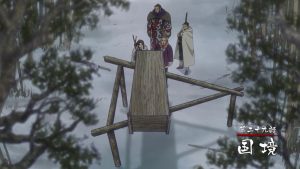 After last week’s inspired exercise in lunatic absurdity (in fact the season as a whole has veered towards the comic side of the ledger so far), we get an incredibly tense and almost entirely serious outing here. It’s also the first ep of the season to focus in mainly on a group other than Sugimoto’s, as Asirpa’s team are promoted from the cold open and epilogue to the entire episode. They’re headed north, having left Toyohara (and thus Sugimoto’s intel) far behind. And Kiroranke is inching ever-further into Asirpa’s circle of trust. And affection.
After last week’s inspired exercise in lunatic absurdity (in fact the season as a whole has veered towards the comic side of the ledger so far), we get an incredibly tense and almost entirely serious outing here. It’s also the first ep of the season to focus in mainly on a group other than Sugimoto’s, as Asirpa’s team are promoted from the cold open and epilogue to the entire episode. They’re headed north, having left Toyohara (and thus Sugimoto’s intel) far behind. And Kiroranke is inching ever-further into Asirpa’s circle of trust. And affection.
 If you thought it would be impossible to find an ethnic group in this region more screwed over than the Ainu, meet the Uilta. More commonly known as the Orok, they inhabit a region of Sakhalin north of where the Ainu did. As of the last census in Russia there was only 346 Orok people remaining, and even in the time of Golden Kamuy Kiroranke remarks that their culture (including “sky burials” in trees) is disappearing. They’re reindeer herders, and Ogata shoots one of their animals without realizing it – leading to a meeting which is all according to Kiroranke’s plan.
If you thought it would be impossible to find an ethnic group in this region more screwed over than the Ainu, meet the Uilta. More commonly known as the Orok, they inhabit a region of Sakhalin north of where the Ainu did. As of the last census in Russia there was only 346 Orok people remaining, and even in the time of Golden Kamuy Kiroranke remarks that their culture (including “sky burials” in trees) is disappearing. They’re reindeer herders, and Ogata shoots one of their animals without realizing it – leading to a meeting which is all according to Kiroranke’s plan.
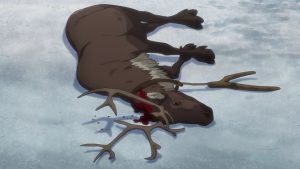 Kiroranke is a bit of a master planner, in fact. His past is finally revealed here, and it’s a whopper. He was one of the Narodnaya Volya (“People’s Will”), a revolutionary group that assassinated Czar Alexander II in 1881. Russia is where he’s been headed this whole time – where he envisions Wilk’s fortune in gold being put to use, presumably – and he’s decided to use the cover of the Uilta (native tribes are tacitly allowed to cross the border) to cross into the Russian half of the island. To do this he uses the pretense of a reindeer hunt to pay for Ogata’s mistake to win the Uilta into his confidence.
Kiroranke is a bit of a master planner, in fact. His past is finally revealed here, and it’s a whopper. He was one of the Narodnaya Volya (“People’s Will”), a revolutionary group that assassinated Czar Alexander II in 1881. Russia is where he’s been headed this whole time – where he envisions Wilk’s fortune in gold being put to use, presumably – and he’s decided to use the cover of the Uilta (native tribes are tacitly allowed to cross the border) to cross into the Russian half of the island. To do this he uses the pretense of a reindeer hunt to pay for Ogata’s mistake to win the Uilta into his confidence.
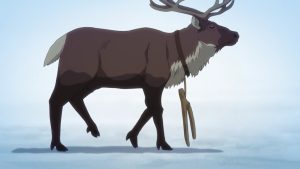 There’s a problem here, though – as clever as Kiroranke is, Tsurumi is matching him move for move. He’s discovered the truth of Kiroranke’s history, and he’s gotten information to the Russians that the man who killed their emperor is about to cross the border. They send a sniper, Vasily, along with a small squadron of soldiers to kill the assassin. But the first man Vasily shoots is the one carrying the Japanese rifle – who turns out to be the Uilta elder, who’d swapped it with Ogata during the reindeer
There’s a problem here, though – as clever as Kiroranke is, Tsurumi is matching him move for move. He’s discovered the truth of Kiroranke’s history, and he’s gotten information to the Russians that the man who killed their emperor is about to cross the border. They send a sniper, Vasily, along with a small squadron of soldiers to kill the assassin. But the first man Vasily shoots is the one carrying the Japanese rifle – who turns out to be the Uilta elder, who’d swapped it with Ogata during the reindeer hunt slaughter.
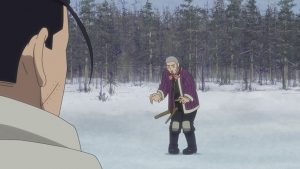 This evolves into a brutally tense game of cat and mouse between Vasily, Ogata, and Kiroranke. The latter risks his life to retrieve what I had assumed to be the body of the elder, whose son’s wailing was truly heartbreaking. But it turns out the old man is alive, and Ogata gets a shot in on the Russian commander as a result of Vasily hesitating to shoot Kiroranke (whose behavior unnerved him). But Ogata shoots the man in the stomach, so that the others will be likely to stay behind and treat him rather than follow as the Kiroranke group flees into the forest.
This evolves into a brutally tense game of cat and mouse between Vasily, Ogata, and Kiroranke. The latter risks his life to retrieve what I had assumed to be the body of the elder, whose son’s wailing was truly heartbreaking. But it turns out the old man is alive, and Ogata gets a shot in on the Russian commander as a result of Vasily hesitating to shoot Kiroranke (whose behavior unnerved him). But Ogata shoots the man in the stomach, so that the others will be likely to stay behind and treat him rather than follow as the Kiroranke group flees into the forest.
 Vasily and Ogata are both snipers to the core – ruthless, cold-blooded and patient. Vasily is happy to use his two comrades as bait, waiting for Ogata to shoot them and reveal his position. But Ogata is too much a sniper not to know that, and doesn’t take the hook. Kiroranke has set a bomb trap for the Russians, and the two men are gravely wounded by it. But as Ogata waits for Vasily to reveal himself by going to their aid, he too is disappointed. These two are operating from the same playbook. Finally Ogata sets up a dummy version of himself trying to draw a location-revealing shot – but again, Vasily susses out the trap before springing it. It’s all pretty flawlessly executed – full of everything that makes Golden Kamuy in “serious” mode so brilliant.
Vasily and Ogata are both snipers to the core – ruthless, cold-blooded and patient. Vasily is happy to use his two comrades as bait, waiting for Ogata to shoot them and reveal his position. But Ogata is too much a sniper not to know that, and doesn’t take the hook. Kiroranke has set a bomb trap for the Russians, and the two men are gravely wounded by it. But as Ogata waits for Vasily to reveal himself by going to their aid, he too is disappointed. These two are operating from the same playbook. Finally Ogata sets up a dummy version of himself trying to draw a location-revealing shot – but again, Vasily susses out the trap before springing it. It’s all pretty flawlessly executed – full of everything that makes Golden Kamuy in “serious” mode so brilliant.


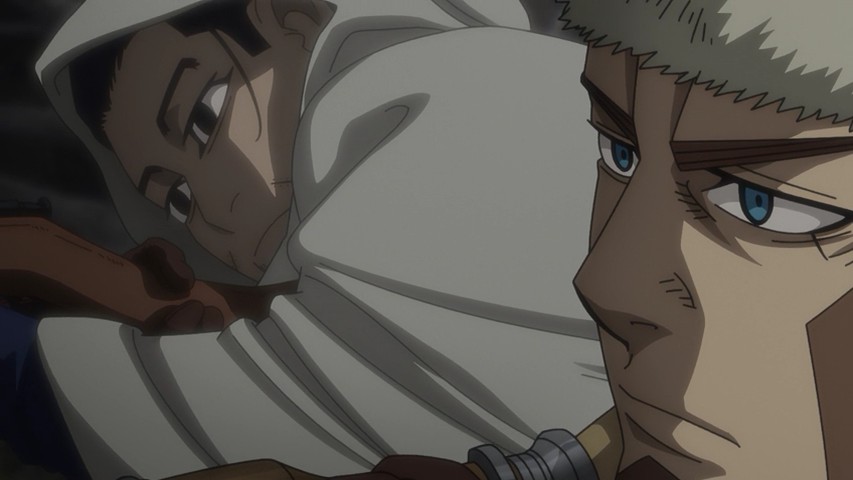
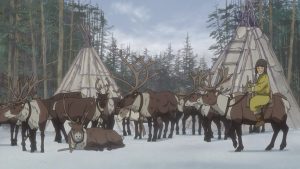
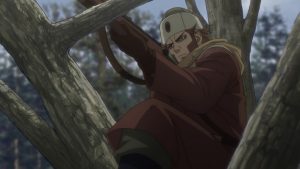
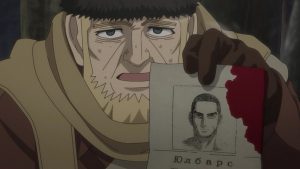

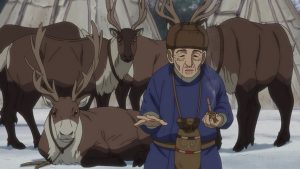


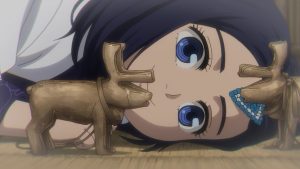
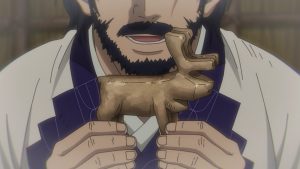
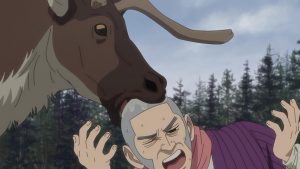
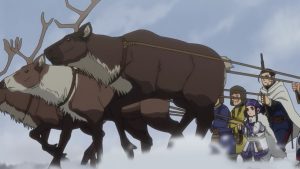
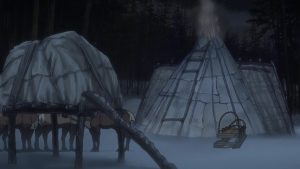

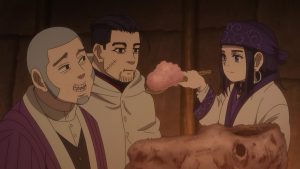
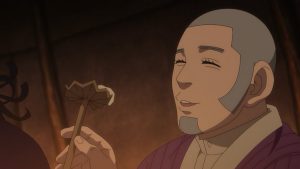

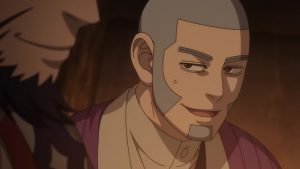

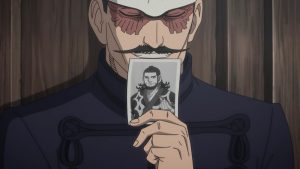

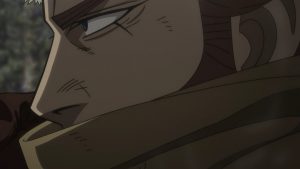

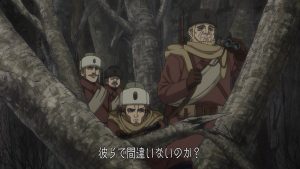
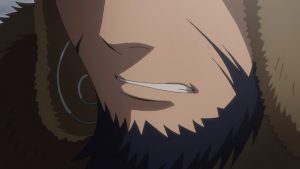

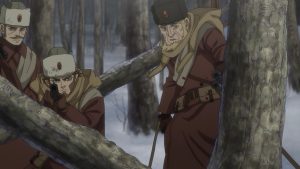
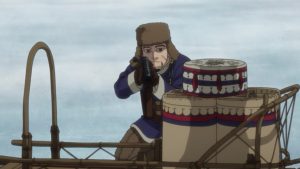
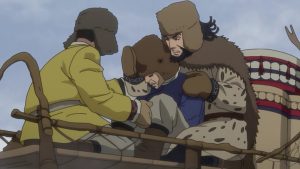
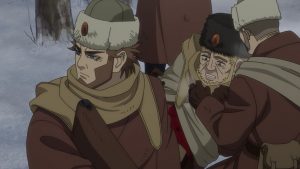

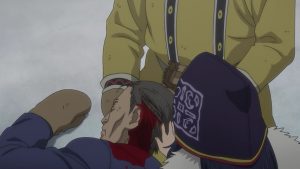
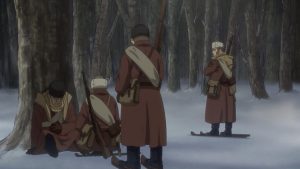
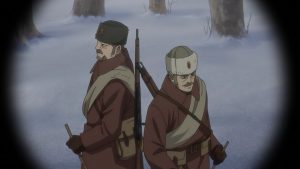

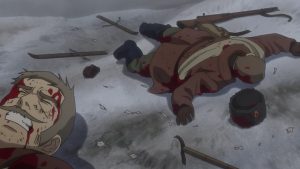
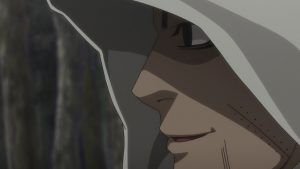

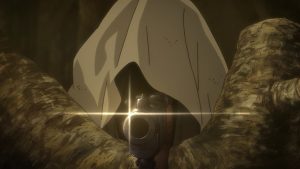
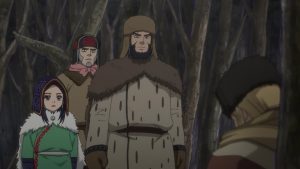


bennydelon
November 3, 2020 at 10:43 pmI can’t exactly explain why, but that slow motion transition from the chrysanthemum seal to the double-headed eagle on the other side of the border marker had an epic feel to it.
I think it’s that “we are far away from home” feeling. And the show capitalized on it by portraying an immediate sense of danger the moment they cross the border. This episode was really well directed.
Anton Kutovoi
November 4, 2020 at 4:45 amI have to say, I’m pretty damn impressed by Umehara Yuichiro’s Russian in this episode.
Guardian Enzo
November 4, 2020 at 9:38 amIt sounded good to me!